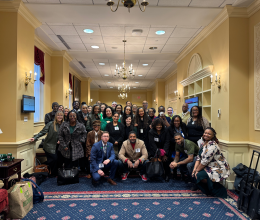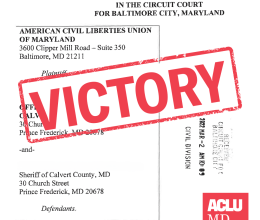
The National Immigration Project, CAIR Coalition, the ACLU, and the ACLU of Maryland asked court for emergency decision to release individuals most susceptible to serious illness or death due to disease.
WASHINGTON, DC (April 30, 2020) — The District Court has ordered the release of an individual detained by U.S. Immigrations and Customs Enforcement (ICE) in Howard County, Md., after an employee at the facility tested positive for COVID-19.
The release is in response to an emergency motion for a preliminary injunction order filed as part of a lawsuit The National Immigration Project of the National Lawyers Guild (NIPNLG), the Capital Area Immigrants’ Rights (CAIR) Coalition, the American Civil Liberties Union (ACLU) Immigrants’ Rights Project, and the ACLU of Maryland filed in March against ICE on behalf of detained individuals with medical conditions that lead to a higher risk of a serious illness or death if infected with COVID-19.
The person being released from the Howard County facility is part of the lawsuit. Two more individuals detained by ICE in Worcester County, Md., have also filed a preliminary injunction motion seeking release this week.
Last week, a nurse at the ICE detention center in Howard County tested positive for COVID-19. The practice of social distancing and hygienic measures are not possible in detention centers. Many detention facilities are susceptible to rapid spread of the virus and are not equipped to handle a coronavirus outbreak. According to a recent study by experts from Brown University and University of California at Riverside, the coronavirus will spread rapidly in detention facilities and in some scenarios, 100% of people detained in a facility could expect to be infected within 90 days.
“Today we are breathing a huge sigh of relief that our client can finally leave the detention center to a place where he can safely self-isolate,” said Sirine Shebaya, Executive Director of NIPNLG. “The progressive spread of COVID-19 at detention facilities is only accelerating, and we will continue to fight to seek the release of all who are medically vulnerable and who continue to be in unsafe congregate environments at this time.”
"We are so thankful that Mr. Coreas is being released from Howard County Detention Center,” said Nick Taichi Steiner, Staff Attorney for the ACLU of Maryland. “Especially now that there is a positive case of COVID-19 there, the risk of exposure can be a death sentence for someone with an underlying health condition. Mr. Coreas's release is exactly what he needs to stay safe during this pandemic.”
“The order to release individuals most susceptible to COVID-19 should not have waited this long,” said Adina Appelbaum, Program Director of the Immigration Impact Lab at CAIR Coalition. “It’s only a matter of time that this virus will spread within the facility – and it will spread quickly. ICE is putting lives at risk for no reason and is violating these detained immigrants’ constitutional right to safety while in government custody. We’re thankful for the release of the individual in Howard County, but we hope that our clients in Worcester County will also be released for the same reason.”
"ICE detention should not be a death sentence, but for our client, it almost certainly would be when a COVID-19 outbreak occurs in the facility," said Eunice Cho, senior staff attorney at the ACLU's National Prison Project. "We are thrilled that our client will be free to return home and practice social distancing and other safety measures, but it isn't enough. So long as ICE has 35,000 people around the country detained, we are facing a public health and humanitarian crisis that impacts people in detention and in communities around the country. We urge the agency to release many more people, and we will continue fighting to ensure that it does."
Previously, the Court had issued an order denying release, but giving petitioners leave to file a renewed motion if, among other things, there was a confirmed COVID-19 case at the facility. The court granted release after the filing of this renewed motion.
To access the TRO, click here. To read the original complaint, click here. To access the court’s decision, click here.
###






